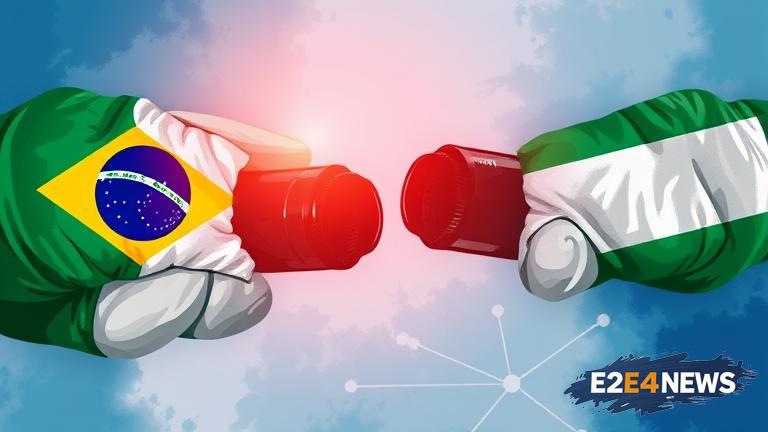In a groundbreaking development, Brazil and Nigeria are discussing a potential collaboration to manufacture generic drugs. This partnership could have far-reaching implications for the global healthcare industry. The idea was recently proposed by Nigerian President Bola Tinubu, who emphasized the importance of increasing access to affordable medications. By working together, Brazil and Nigeria can leverage their combined expertise and resources to produce high-quality generic drugs. This collaboration could help bridge the gap in healthcare access, particularly in low- and middle-income countries. Generic drugs are a crucial component of modern healthcare, offering a more affordable alternative to brand-name medications. However, many countries struggle to produce these drugs domestically, relying on imports from other nations. The partnership between Brazil and Nigeria could change this dynamic, enabling the two countries to become major players in the global generic drug market. Brazil, in particular, has a well-established pharmaceutical industry, with a strong track record of producing high-quality medications. Nigeria, on the other hand, has a large and growing population, making it an attractive market for pharmaceutical companies. By combining their strengths, the two countries can create a robust and sustainable generic drug manufacturing sector. This collaboration could also have significant economic benefits, creating new job opportunities and stimulating economic growth. Furthermore, the partnership could help improve healthcare outcomes in both countries, as well as in other parts of the world. The production of generic drugs could increase access to essential medications, leading to better health outcomes and improved quality of life. In addition, the collaboration could facilitate the transfer of technology and expertise, enabling Nigeria to develop its own pharmaceutical industry. This, in turn, could help reduce the country’s reliance on imported medications, improving its trade balance and enhancing its economic stability. The partnership between Brazil and Nigeria is also likely to have a positive impact on the global healthcare landscape. By increasing the availability of affordable generic drugs, the collaboration could help reduce the burden of healthcare costs on individuals and families. This, in turn, could lead to improved health outcomes, as people are more likely to seek medical treatment when it is affordable. The collaboration could also help address the issue of medicine shortages, which are a major concern in many parts of the world. By producing generic drugs domestically, Brazil and Nigeria can reduce their reliance on international supply chains, making them less vulnerable to disruptions and shortages. Overall, the partnership between Brazil and Nigeria has the potential to be a game-changer in the global healthcare industry. By working together, the two countries can create a more sustainable and equitable healthcare system, improving access to essential medications and enhancing health outcomes. The collaboration is a testament to the power of international cooperation and the importance of working together to address global challenges. As the partnership moves forward, it will be important to monitor its progress and evaluate its impact on the global healthcare landscape. With its potential to increase access to affordable medications, improve health outcomes, and stimulate economic growth, the collaboration between Brazil and Nigeria is an exciting development that could have far-reaching implications for the future of global healthcare.
